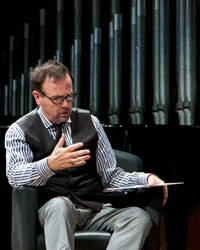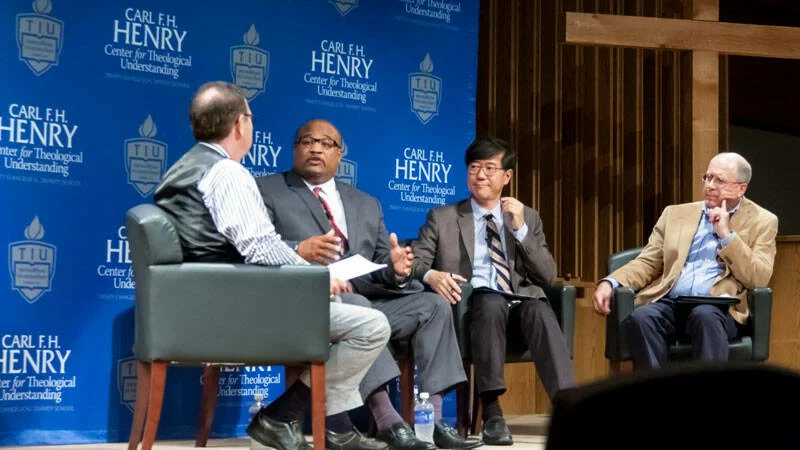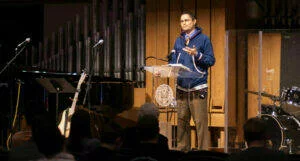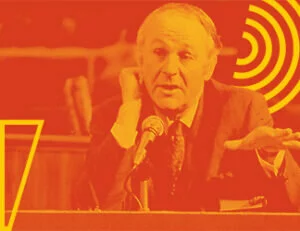Trinity’s faculty kicked-off the 2014-2015 calendar of events last Wednesday, speaking with passion about the perennial and urgent importance of the doctrine of reconciliation.
In this symposium held at Trinity International University in the Arnold T. Olson Chapel, Dr. Greg Waybright, Dr. Peter Cha, Dr. Mike Reynolds, and Dr. Harold Netland conversed on a panel regarding the role of reconciliation in the Christian faith.
Dr. Greg Waybright, former president of TIU and current senior pastor of Lake Avenue Congregational Church in Pasadena, California, moderated the conversation that took place on September 10, 2014. Each panelist shared their thoughts, research, and experiences regarding the importance and significance of reconciliation in a Christian’s life, in the church, and in society at large.
The need for reconciliation was demonstrated through the Biblical passages in Genesis 2 and 3, and Revelation 21-22. In Genesis 2, shalom (perfect peace and wholeness) reigned over all of creation. Man and woman walked with God, naked and unashamed. There was no need for reconciliation because everything was in right standing with everything else. However, in Genesis 3 with sin came brokenness. No longer were man and woman walking with God, but hiding from God as they were filled with shame due to their nakedness. Blame replaced the unity and all relationships became disordered. But in Revelation 21-22, with the return of Christ, all things become restored. The things that caused tension, conflict, and strife no longer remain with the second coming of Christ, which is what Christians long for.
Key ideas from the discussion
- Reconciliation as a word suggests relationship, but a relationship that has been broken and then restored. (GW)
- Historically, in a white context, reconciliation was seen along a vertical line between man and God, but with increasing diversity in cities and neighborhoods, it has expanded to racial and ethnic horizontal reconciliation. (GW)
- In the Matthew 18 passage on reconciliation, there are three actors: the oppressed, the oppressor, and the reconciler (often times the neutral third party). All three parties are called to be initiators of the reconciliation process. (MR)
- There is a gap between perception and reality. This is often times the greatest hindrance to reconciliation. (HN)

Greg Waybright moderates the conversation.
- Acts 6 gives us a case study on Affirmative Action: they took qualified people from a “foreign” group and gave them a place at the table so that their voices could be heard. They recognized that their understanding would be deficient without allowing someone else an opportunity to have an influential voice. (MR)
- Reconciliation work is often three steps forward and two steps back, or even two steps forward and three steps back. In a fallen world, people don’t want to have peace made, people want to see peace kept. (GW)
- The most pressing needs for reconciliation in relationships are when one party has taken advantage or abused someone else. In society at large, reconciliation needs to take place where there are class, wealth, power, gender, and ethnic divisions. Globally, there will need to be more intentional efforts between Christians and Muslims and with the immigration issue which is political, but deeply personal as families are being torn apart. (HN)
- In the church, Christians are demonizing one another, as there is greater polarization over various positions and issues (ie. gender issues, immigration, tax policy, affirmative action, etc.). Reconciliation doesn’t mean we all agree with each other or that everyone has to agree with me. What is wrong in the disagreement is the demonizing that occurs with those who disagree with my position. We need a civility that will allow us to disagree respectfully. (HN)
- Civility is intellectual hospitality. (GW)
- With conflict and division all around us, the question becomes how do we become faithful witnesses in our own Jerusalem, Judea, Samaria, and the ends of the earth? Among Korean Americans, the Jerusalem conflict is among generational lines as many 2nd generation Korean Americans left the 1st generation Korean American because they felt marginalized. (PC)
- Reconciliation is an ecclesiological issue. The reason God places a church into a community is that it serves as a vehicle for reconciliation as churches practice incarnational ministry. (PC)
- As a family of God, who we include in the word “us” is expanded beyond a biological family; a true family of God gets rid of the idea of the “other.” (MR)
- Church is not a social work agency. Church is a family. If this is true, then people will not walk through their struggles alone as churches are involved in God’s reconciling work. (GW)
- Willie Jennings, “Often, Christians don’t take seriously the history of a place.” As demographics are always changing, the sense of a church’s local mission should change with the demographics. We see that churches don’t do this when the churches remain the same demographically despite their surrounding neighborhoods changing. (PC)
- Church is an impossible institution that cannot be done without God. It’s a refuge and a hospital for the sick, but it also has a prophetic function that people need to embrace. (HN)
When it comes to reconciliation, the church must engage in both a vertical and a horizontal effort, all affirmed with passion and civility. It is not easy work, but it is the work that Christians are called to.
Join us throughout the year as we continue to explore the call of Christians to engage in the work of reconciliation.







Comments
Be the first one to make a comment!